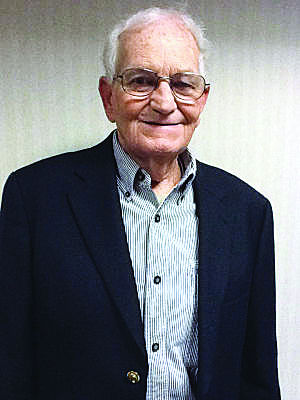“Ring out the false, ring in the true.”
Alfred Lord Tennyson
While thinking about writing this article, I reminisced about my flying days in the Air Force, and working on electronic compass systems in the field of avionics. The compass systems demanded 100 percent accuracy, as did all the other systems on the aircraft. The Navigators’ and Pilots’ lives depended on it being so. Without the compass systems being accurate, the intended course of flight would be altered. The heading always had to be true. There was no room for error.
Our lives are like those compass systems also, although we have the human factor involved we all strive to keep our headings true as we follow through with our life’s journey — our “life’s flight.” As a Navigator and Pilot plan for that flight, we make plans along our journey, with hope that the plans will be met with successful results.
At this time of year many of us are making resolutions for the New Year, with hope that they be fulfilled.
Most of us know that we may have to make deviations from our plans, course corrections if you will, due to the many events we may encounter. And, for most of us, we do so without much difficulty.
We simply realize that the plan as we originally intended was not to be fulfilled.
We just delay the plans, or simply shrug them off with hope that they will be fulfilled — not now, but later. Or, we may abandon the plan altogether and devise a different plan.
If you are like me, as I know many of you are, I contemplate my plans for the New Year — taking that vacation, following my health plan, etc., with knowledge that not all my plans will be fulfilled. You may resolve to quit smoking, to lose weight and eat more healthy, to exercise more, to visit with friends and family members more, to cut down (or quit) ethyl alcohol beverage consumption, to attend church services more often, to take that trip you always wanted to take, to resolve to give your employer 110 percent, to do volunteer work, to change your “dis-ability” to “ability…” and so on. For some, following through with the plans is most frustrating and often unattainable…but for most (even though the plans may not be completely fulfilled) the heading will remain true and the plans will be obtained if not, at the very least, will begin to unfold.
I suggest to you that “the journey begins with the first step.” No matter what our planned goals are, we cannot begin to obtain them without taking initial action. Talking about it does not mean action. We must be motivated and determined to initiate the action. It should be mentioned that probably over 90% of the people who make New Year’s resolutions fail to follow through with their plans, so having motivation to begin your process is certainly very important.
In my many counseling sessions, wherein change is a most important issue, I first empathized the need to define just what it is that the person wishes to change. This is equally important in making realistic plans for the year (the word “realistic” is most important), and involves writing down all the goals one wishes to achieve in the year; whether it is in losing weight, stopping smoking, a vacation; or other goals. One should question whether the goal is really realistic for them. Everyone is different, of course, and one should not assume that their goal is something they really believe they can obtain. Talking it over with family and friends will be most beneficial.
Once the list is completed, the next step which will logically follow is what it will take for one to reach each of the goals and the time necessary toward the completion of the goal. Perhaps it will take saving money for the vacation or other similar actions, or having a support system in play for stopping smoking, cutting down or quitting ethanol beverages, etc.
Third, is the monitoring of where one is at on their path of achieving the particular goal. This continuous review is important as it keeps one on course with the goal, and allows for any modification that needs to occur. As examples, monitoring ones weight and following a menu is important toward losing weight; monitoring ones saving finances toward that vacation, etc.
Quite often we set ourselves up for failure when we concentrate on the ultimate goal instead of concentrating on just how we are going to accomplish the goal. This is a trap that one can avoid by keeping things simple, taking baby steps toward the goal and not concentrating on the ultimate picture. This could be most frustrating, and may tend to have one give up as “it is just too hard for me to do!” The good news here is that there exist a lot of support groups to help you along your path…if food is a problem there is Overeaters Anonymous, Weight Watchers, and other supportive groups; if the problem is alcohol there is Alcoholics Anonymous; there are financial planners in the community to help with setting up a budget or financial plan; there is a lot of help out there.
Most importantly one should not be frustrated and unhappy about not obtaining a particular goal or resolution. Being honest and realistic toward oneself are the most important components of reaching a goal, and one must keep their “heading true” in this regard. Until next time, Stay Healthy my Friends!




